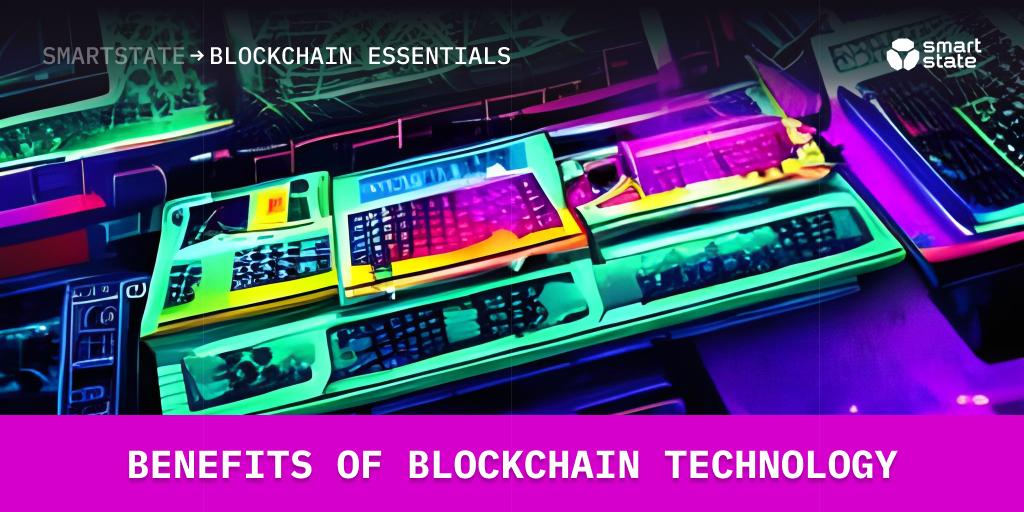Benefits of blockchain technology
Blockchain is based on a distributed ledger technology where each node or device in the chain keeps a copy of the whole network. Each block contains a data set, the current block hash value and the previous block hash. The participants of this peer-to-peer network are able to see the same information in the individual blocks, making any transaction recorded in one place visible to each node or device, with the participants having the option to confirm or reject it. This technology is hard to hack as no single computer has control over the whole data, and modifications done to one block affect the entire chain.
A new block in the blockchain is created by hashing the values, current and previous. Before a new block appears in the chain, the nodes must reach a consensus through specific cryptographic algorithms, which help to prevent a single point of attack (more than a half of the chain’s network must validate the transaction). After reaching consensus, the new block is added.
There are four types of blockchain networks nowadays. These are public networks (such as Ethereum or Bitcoin, where any user can read the public blockchain, send transactions or participate in the consensus procedures), semi-private (operated by a certain group, which gives access to users, who meet their criteria, making these chains not completely decentralized), private (a certain group holds control over the blockchain and decides who can read, send transactions and participate in the consensus procedures, which doesn't make them very effective, due to their centralized nature) and consortium networks (the consensus procedures on these chains are controlled by a specific pre-selected group, who decide if the reading the blockchain and sending transaction will be public or restricted).
Blockchain benefits and advantages
Blockchain technology has a number of advantages, which make it so attractive:
- Transparency. Transparency is one of the biggest issues. Blockchain brings complete decentralization and absence of a centralized authority. A chain consists of peers, who validate the transactions and they are free to choose if they wish to participate in validation, although it is not obligatory. No one takes hold of the whole data, each node keeps the copy of each validated transaction and transactions are visible to all participants, which makes the process completely transparent.
- Security. All the transactions should be agreed on according to the consensus algorithm procedures, encrypted and linked to previous blocks by means of the hashing method. Each node keeps a copy of every transaction which makes single point attacks impossible. Anyone wishing to interfere with the transaction will be rejected by other nodes and will not be able to make records. Any data ever written in the blockchain can not be reverted. Blockchain uses digital signatures and cryptography to ensure all the data passed along in the chain is secure.
- Traceability. Owing to its peer-to-peer nature, blockchain allows working with both vendors and buyers. In common supply chains there are a lot of issues, including theft and losses. But the blockchain, being transparent, enables all participants to trace assets and make sure they won’t be replaced, misused or lost.
- Reduced costs. A lot of money is always spent on improvements to make systems faster and more secure. On a blockchain it is possible to take down many expenses associated with third parties. There is no centralized authority, thus there is no need to pay them. Less interaction is needed to validate transactions and money and time is not wasted on intermediaries.
- Speed. Blockchain offers better solutions for time-consuming processes and makes them much more efficient, automating them and eradicating human factor errors. All the data is stored in a decentralized ledger. The technology is being improved constantly and new ways of accelerating the processes are invented (so new networks can handle bigger transaction volumes than the older ones). Transactions are automated with the help of smart contracts which increase speed and bring down (or even take away) the need for human intervention.
- Anonymity. A blockchain is anonymous, which is very important. Some blockchains offer nameless wallet address models. Users are not obliged to provide any personal data to generate an address. Other ones use stealth addresses and ring signatures, which builds up complete anonymity. Moreover, when data is verified and added to the blockchain during the consensus procedure, the participants' data is translated into a complicated code (it also raises the security level, as the information can not be read without a special key).
Conclusion
The blockchain technology is altogether attractive. It enables companies and organizations to apply different levels of accessibility, process transactions much faster and in an automated way, offer higher security levels and retrieve any information, which was once written there, in case of accidental loss. Certainly, there is a long way to go further, and the networks are constantly improving to become even more secure and convenient.

